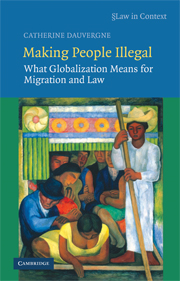Book contents
- Frontmatter
- Contents
- Acknowledgments
- Publication acknowledgments
- 1 Introduction
- 2 On being illegal
- 3 Migration in the globalization script
- 4 Making asylum illegal
- 5 Trafficking in hegemony
- 6 The less brave new world
- 7 Citizenship unhinged
- 8 Myths and Giants: The influence of the European Union and the United States
- 9 Sovereignty and the rule of law in global times
- Bibliography
- Index
- The Law in Context Series
- References
8 - Myths and Giants: The influence of the European Union and the United States
Published online by Cambridge University Press: 05 June 2012
- Frontmatter
- Contents
- Acknowledgments
- Publication acknowledgments
- 1 Introduction
- 2 On being illegal
- 3 Migration in the globalization script
- 4 Making asylum illegal
- 5 Trafficking in hegemony
- 6 The less brave new world
- 7 Citizenship unhinged
- 8 Myths and Giants: The influence of the European Union and the United States
- 9 Sovereignty and the rule of law in global times
- Bibliography
- Index
- The Law in Context Series
- References
Summary
Tales of globalization invariably return to one of two geographies – the European Union or the United States. In the case of Europe this turning is a romantic longing: a sense that Europe is the peaceful way of the global future. With good luck and good governance we can imagine Europe is what globalization will mean for all of us: eroding borders and diminished sovereignty, all to mutual benefit. Europe is set on a course of steady expansion, spreading the blanket of strong human rights protections and robust international law ever eastward and southward. Candidate countries are eager to comply and join; enticed by the prospect of economic union, they rush to improve conditions of human flourishing. What could be better for all than to turn the globe itself into an area of freedom security and justice? The United States is the twin avatar of globalization. Although the image is not exclusively rosy, the United States is the sole remaining superpower, winner of the Cold War, uncontested hegemon. In contrast to Europe, the United States is engaged in a more “direct delivery” method for the global spread of democracy and human rights. There is enormous contestation within and outside the United States about the virtues and values of its war on terror. This is a debate about methods, not about the ultimately unambiguous good of conquering terrorism and bringing the disputes it represents within an appropriately broad democratic umbrella.
- Type
- Chapter
- Information
- Making People IllegalWhat Globalization Means for Migration and Law, pp. 142 - 168Publisher: Cambridge University PressPrint publication year: 2008



